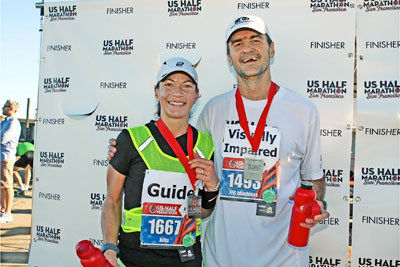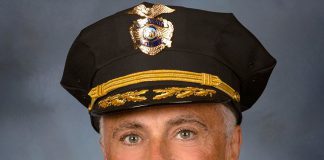
Six years ago, while swimming laps with a Masters swim team, I found myself sharing a lane with a tall Romanian man named Corvin. It wasn’t until after the workout, when he picked up his red-and-white cane, that I realized Corvin was visually impaired.
I was overcome with a sense of admiration. As I got to know Corvin, I learned that he also competed in triathlons and biathlons.
Since then, his sight has deteriorated, eliminating his ability to compete in cycling, but that has not slowed him down in the least. Year after year, Corvin raises the bar with new physical challenges.
Corvin is 38 years old and has a progressive genetic disorder called Usher syndrome Type III, which results in deafness and blindness caused by retinitis pigmentosa.
Most of his hearing loss happened when he was a child.
Then, as a teenager, he experienced night vision problems, which gradually progressed to loss of peripheral vision, eventually requiring him to use a cane for mobility.
There’s no known cure for Usher syndrome, but organizations including Foundation Fighting Blindness continue to research solutions.
Over the years, Corvin and I have stayed in touch. I’ve helped him with his nutrition and coached him toward triathlons and other events.
In 2010, Corvin asked me to create a plan that would prepare him to hike Mount Whitney. He would be going with guide. The date was set for three weeks out. Three weeks!
With cautious optimism, I put together a plan, lectured him about breaking in his hiking boots and crossed my fingers.
Unaccounted-for obstacles, such as complete lack of vision during pre-dawn miles, technical trail conditions, fierce wind gusts and blisters, slowed Corvin’s pace significantly. He was forced to turn around at 13,600 feet — less than 1.5 miles from the summit — and reached the bottom just before sunset.
He left Mount Whitney with mixed feelings of fatigue, disappointment and a glimmer of hope to return one day.
In 2012, Corvin joined a relay team for the Big Sur Marathon and planned his second attempt to summit Mount Whitney.
At the Big Sur Marathon, he was responsible for the first 10 miles of the race, at which point he would “pass the baton.” He exceeded his goal, completing his leg in one hour and 19 minutes, but facing the prospect of standing around for two hours waiting for a shuttle, he figured he might as well keep running. He finished the entire marathon. That night he slept 11 hours straight.
In preparation for his second Mount Whitney pursuit, he gave himself ample time to train, resolved some gear issues and went in knowing what he would encounter.
The first part of the hike went well. However, at 13,875 feet — less than a mile from the summit, dealing with fatigue and technically demanding trail conditions — Corvin was faced with an extremely difficult decision.
He wanted so much to reach the summit, and it was closer than ever, but with his mounting exhaustion, he knew it was risky and “one misstep could easily turn costly.”
With his wife and daughter in his heart and tears in his eyes, he turned around and headed down the mountain. It was an emotional and courageous journey.
Last year, Corvin and I joined forces at the U.S. Half Marathon in San Francisco.
In the past, he had run without a guide, visually tracking the runners in front of him and occasionally bumping into people or tripping. His deteriorating vision prompted Corvin to consider the advantages of racing with a guide.
With a couple of practice sessions under our belts, we joined the crowd of runners in the starting chute of the race, each grasping the opposite end of a tether. Our biggest challenge during the race was navigating around other runners, as running side by side made us double-wide.
While hearing aids normally compensate for Corvin’s hearing loss, he cannot wear them while running, so I shouted a steady narration of the course and amplified cheers from fellow runners.
We finished the half marathon in one hour, 51 minutes — seven minutes faster than his previous record on the course. It was an exhilarating experience for both of us.
We are now plotting for the San Francisco Rock ’n’ Roll half marathon in April.
From the day I met Corvin, he has inspired me. He never lets the loss of his vision and hearing stop him from finding new ways to challenge himself. Rather than defeat, he sees opportunity and possibilities.
His unyielding motivation and optimism are contagious. I’m proud to be on Corvin’s team.
– Julia Blanton is a nutrition, fitness and wellness coach. An avid runner, she keeps a health blog at www.juliablanton.com.












